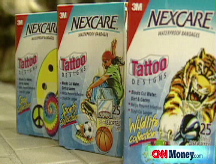Stocks hit by recession fears
Wall Street retreats as earnings jitters take hold.

NEW YORK (CNNMoney.com) -- Stocks slumped Tuesday as mixed corporate earnings reports gave investors a reason to retreat after the previous session's big rally.
The Dow Jones industrial average (INDU) lost 231 points or 2.5%. The Standard & Poor's 500 (SPX) index lost 3.1% and the Nasdaq composite (COMP) lost 4.1%.
Lending rates continued to improve, helping to reassure investors that the efforts of world governments to try and stabilize financial markets are starting to work. But relief about the credit markets was countered by broader fears about a recession and the health of American corporations.
"The credit market is improving, which is good, but the problem is that everyone is focused right now on earnings as a representation of the economy," said Greg Church, founder and president of Church Capital. "And while there will be exceptions, the overwhelming number of earnings reports won't be positive."
With 21% of S&P 500 companies already having reported results, third-quarter profits are currently on track to have fallen almost 10% from a year ago, according to the latest estimates from Thomson Reuters.
After the close, Yahoo (YHOO, Fortune 500) reported earnings of four cents a share, versus 11 cents a year ago and short of analysts' forecasts for a profit of 9 cents per share. The company also said it will cut at least 10% of its workforce, or around 1,500 people, through the end of the year as a result of the weak economy.
Looking forward, Yahoo warned that 2008 revenue won't meet its earlier forecasts. However, shares gained 7% in extended-hours trading.
Also after the close, Apple (AAPL, Fortune 500) reported fourth-quarter sales and earnings that jumped from a year ago due to strong sales of its new iPhone. Earnings topped forecasts, while sales missed expectations.
Looking forward, Apple forecast fiscal first-quarter sales and earnings that are short of analysts' projections. The company said forecasting the December quarter was a challenge because of the weak economy. Shares gained 4% in extended-hours trading.
The Dow gained 413 points Monday on improved lending rates and comments from Federal Reserve Chairman Ben Bernanke that supported a second fiscal stimulus package. It was the Dow's eighth-biggest one-day point advance ever, but did not spark a follow-up rally Tuesday.
"I think the tone in the stock market has been a little better recently with the credit spreads coming down," said Robert Loest, portfolio manager at Integrity Funds. "But I'm reluctant to get too optimistic because the economy is going to continue to deteriorate both in the U.S. and abroad."
Earnings: Dow component American Express (AXP, Fortune 500) reported weaker quarterly profit after the close of trade Monday. However, the results were better than expected and shares gained 8.4% Tuesday. (Full story)
Four other Dow components reported results Tuesday morning, including 3M (MMM, Fortune 500), which reported higher quarterly sales and earnings that topped estimates. Shares gained 4.8%.
DuPont (DD, Fortune 500) reported a big drop in earnings due to manufacturing disruptions in the wake of Hurricane Ike. The chemical giant also warned that full-year results won't meet forecasts. Shares fell 8%.
Caterpillar (CAT, Fortune 500) reported lower earnings and higher revenue versus a year ago, and shares fell 5%. Pfizer (PFE, Fortune 500) reported higher quarterly earnings that topped estimates. Shares were little changed.
Texas Instruments (TXN, Fortune 500) reported reduced third-quarter profit after the close Monday and forecast fourth-quarter revenue would fall sharply, missing estimates. The chipmaker also said it is looking to sell part of its wireless operations. Shares fell 6.3% Tuesday.
Among other companies releasing results, troubled bank National City (NCC, Fortune 500) reported a bigger-than-expected loss Tuesday and said it was cutting 4,000 jobs. However, investors lifted the shares, which have been battered soundly over the last few months on fears about the firm's solvency. The stock added 3%.
Citigroup (C, Fortune 500) slumped 6% in tune with the broader selloff and also in response to Goldman Sachs' reinstatement of its sell rating on the company.
In other company news, Kirk Kerkorian's Tracinda is dumping 7.3 million shares of Ford Motor (F, Fortune 500) and could end up selling the rest of his 6% stake in the automaker. Ford shares lost 6.9%.
A number of stocks that had led the advance Monday retreated Tuesday, including oil services firms Chevron (CVX, Fortune 500), Exxon Mobil (XOM, Fortune 500), ConocoPhilips (COP, Fortune 500) and BP (BP).
Market breadth was negative. On the New York Stock Exchange, decliners topped advancers by over two to one on volume of 1.16 billion shares. On the Nasdaq, losers beat winners by five to two on volume of 2.17 billion shares.
Credit market: Lending rates continued to improve Tuesday, extending the weeklong recovery.
Libor, the overnight bank-to-bank lending rate, fell to 1.28% from 1.51% Monday, according to Bloomberg.com. That set the rate below the Fed's benchmark lending rate of 1.5%, a good sign for the credit market. Libor hit a record 6.88% earlier this month at the height of the market panic.
The 3-month Libor rate, which banks charge each other to borrow for three months, fell to 3.83% from 4.06% late Monday.
The TED spread, which is the difference between what banks pay to borrow from each other for three months and what the Treasury pays, narrowed to 2.63% from 2.97% late Monday. The spread hit a record 4.65% earlier this month. The narrower the spread, the more willing banks are to lend to each other.
The improvement in bank lending over the last week is critical and analysts say it must continue to improve in the months ahead. Credit froze up in the wake of the housing market collapse, the subprime lending fallout and contraction in the bank sector.
The lack of available credit has punished the already weak economy, making it hard for businesses to function on a daily basis and for consumers to get loans.
The Federal Reserve and banks around the world have made potentially trillions of dollars available to lending institutions. On Tuesday, the Fed said it will start buying commercial paper from money market mutual funds. Commercial paper is a short-term funding source that companies need for daily operations.
Treasury prices rallied, lowering the yield on the 10-year note to 3.70% from 3.84% late Monday. Treasury prices and yields move in opposite directions.
The yield on the 3-month Treasury bill, seen as the safest place to put money in the short term, rose to 1.19% from 1.05% late Monday as investors began to pull money out of the safer investment and put it back in stocks.
Last week, the 3-month fell to below 0.2%. Last month, it reached a 68-year low around 0% as investor panic hit its peak.
Other markets: In global trade, Asian markets ended higher and European markets ended lower.
U.S. light crude oil for November delivery fell $3.36 to settle at $70.89 a barrel on the New York Mercantile Exchange after hitting a 13-month low last week.
Oil prices have been slowing since crude peaked at an all-time high of $147.27 a barrel on July 11. But the decline has been a mix of speculators leaving the market and investors betting that a slowing global economy means weaker oil demand. As a result, the falling oil prices haven't helped stock investor sentiment much.
Gasoline prices fell another 3.4 cents overnight, to a national average of $2.889 a gallon, according to a survey of credit-card activity by motorist group AAA. It was the 34th consecutive day that prices have decreased - in the past month alone, they're down more than 93 cents a gallon.
COMEX gold for December delivery fell $22 to $768 an ounce.
In currency trading, the dollar rose against the euro and yen. ![]()




